In the fourth chapter of our series, we go into detail on how to stay focused at work during difficult or boring tasks and how not to lose sight of your career goals.
We’ll start with some actionable tips you can instantly put into practice to become more focused and productive. Then, we’ll venture into some more long-term processes to help you get back on track with your career goals.
How to Stay Focused at Work by Preventing Distractions
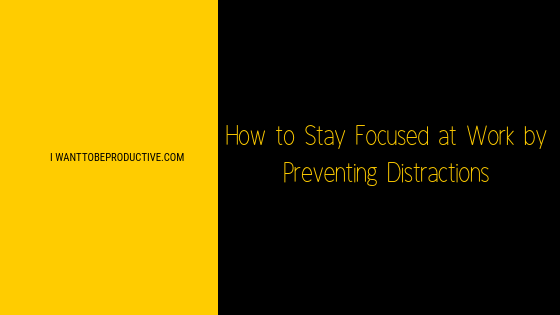
We already mentioned the importance of creating a distraction-free environment in Chapter 1 of this series, Can’t Concentrate – if you want some quick facts about how much of a problem interruptions really are, check it out.
Research psychologist Larry Rosen also touches on the importance of creating a distraction-free environment in his book iDisorder: Understanding Our Obsession With Technology and Overcoming its Hold on Us. According to Rosen, the real issue is that we’ve been classically conditioning ourselves to respond upon cue rather than based on a set schedule, which might ultimately work much better for most of us.
And since this behavior has become so deeply embedded into our routine, Rosen also warns of the dangers of smartphone separation anxiety – the stress that comes with keeping yourself away from your phone. That intrusive feeling that you’re missing out on important info can get much more distracting than a notification on its own.
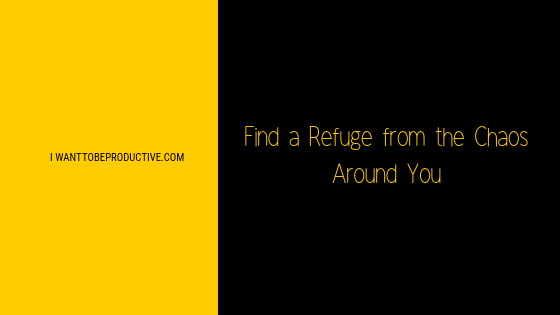
If you can’t focus at work because of the environment, find a refuge from the chaos around you. An isolated office or nook can do wonders for your focus. Here are some tools and gadgets that might help you isolate yourself from an active environment:
- Noise-canceling headphones or earplugs – if you work in a noisy environment, these are a lifesaver.
- Task management apps – great for keeping track of the tasks at hand, especially if you work in a team.
- For individual tasks, set clear focus/distraction-free work intervals for yourself starting at 15 minutes with a few minutes to spare in between. Once you get accustomed to this new schedule, slowly increase the focus intervals to 18, 20, 25, and 30 minutes
. During these intervals, completely isolate yourself from instant notifications from your phone, laptop, or PC, as well as software you don’t need for the current task or that’s distracting. You can go for longer work intervals after a while, but make sure you don’t overdo it! This can easily get counter-productive if you’re not properly fighting the phone separation anxiety.Ideally, for group tasks, people should have a small window to check their phones every 15-30 minutes for the exact same reason. The most important thing is to take control of your mind and focus, not allowing your urges and feelings to control you.
- FocusAtWill.com – a cool music streaming service that produces and curates tunes to improve focus for creative or logical thinkers, entrepreneurs, and students.
- Drop multitasking to stay super focused. I’ve mentioned how multitasking affects your performance in previous chapters, but here it goes again: multitasking is decreasing your focus, impairing your memory, increasing stress levels, and draining your mental abilities. In fact, it looks like multitasking causes a 10% drop in IQ and a 40% drop in productivity. You might think you’re getting more done, but you’re actually sacrificing the quality of your work and most of the time it’s simply not worth it.
- Apps that limit screen time – essential if you just can’t stay away from your phone.
Make a Realistic Schedule for the Day & Stick to it
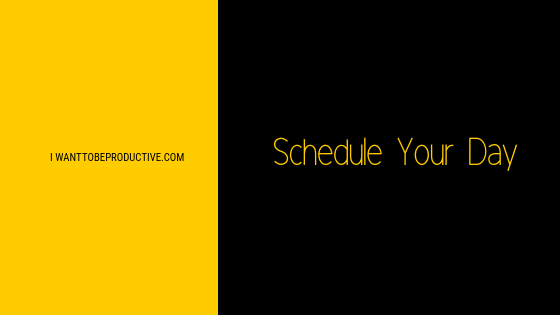
Lists are friends, always. Knowing exactly what you need to do during a work day and how to prioritize your tasks helps you focus, makes you a reliable employee, and gives you a well-deserved sense of satisfaction.
For me, scheduling my day also changed the way I perceive time. I get more stuff done and have a greater sense of accomplishment at the end of each day, not to mention it also helped me prioritize tasks better.
Generally speaking, you need to follow the same principles for your daily schedule (which is basically a short-term goal) as for your SMART goals mentioned a bit further down.
Here’s how to make a schedule and better prioritize tasks at work when everything seems high priority:
- Gather all the tasks you consider getting done in a day in a list. You can add
more, if you’d like. The order isn’t important, what matters most is to have them written down. - Select the urgent ones. Are there any tasks that will have a negative impact if not completed by the end of the day, such as client deadlines or stuff needed by other departments?
- Assess the importance of each task. There are exceptions, of course, but generally speaking, it’s best to think about the number of people impacted by each task completion. This ensures you start off with the most valuable tasks for your team and organization.
- Put draining, lengthier tasks first. As mentioned in Chapter 1 of this series, it’s generally better to start off with the tasks that drain you most. Creative work and decision making are usually the ones that tire us out the most, but this highly depends on the individual.
- If you’re swamped, blurt it out. There will be times when you won’t be able to complete all tasks on your list or everything that needs to be ready in a day. This is when the responsible thing to do isn’t to overwork yourself like most people would, but to communicate the fact further up. This way, you make sure everybody knows how much each task takes to complete, which is essential for future planning.
Identify & Eliminate Mental Blocks to Improve Focus
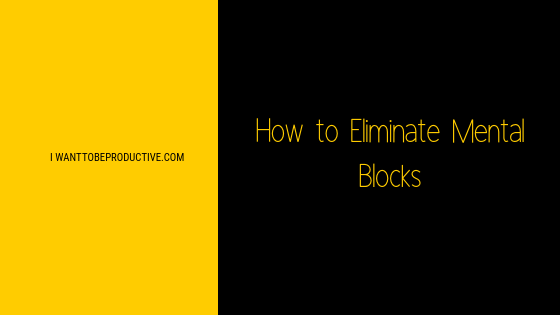
Mental blocks are the most common and frustrating form of self-sabotage.
Their causes are:
- A fixed mindset. A fixed mindset prohibits you from seeing your actual potential.
- Self-doubt. Be it general anxiety, a specific fear, or imposter syndrome, self-doubt will make you feel unqualified.
- Uncertainty. You simply cannot determine the best way to carry out a decision and you’re caught in a limbo of possibilities.
- Indecision. Whether you’re unsure about your priorities or skills, indecision drastically reduces your ability to focus and vice versa.
- Comparison with others. The belief that there’s a limited amount of success or that you need to claim as much ground as fast as possible.
- Overestimating yourself. Being optimistic is a good thing in itself, but when it comes to how much you can get done, it’s a slippery slope. That’s how you get burnout. Believe me, you don’t want to get burnout.
- Getting tunnel vision. Locked into your own head, being subjective, unable to gain perspective over a situation, overestimating obstacles, underestimating yourself and your work, are just a few examples of how tunnel vision works.
How to identify the cause(s) of a mental block:
1. Start working on a task.
2. Every time you get distracted or find yourself doing anything else than working, pay attention to your thoughts.
3. Write about:
- Repetitive or intrusive thoughts;
- Obstacles you face when trying to get back to the task;
- Any other patterns you notice along the way
With time, you will become much more self-aware and naturally eliminate these faults. This is one of the most effective ways to stay focused on difficult tasks.
Improving Focus at Work by Minimizing Decision Making
When Obama was asked why he only wears blue and gray suits, this was his answer:
“I’m trying to pare down decisions. I don’t want to make decisions about what I’m eating or wearing. Because I have too many other decisions to make.”
And he’s not the only one. In fact, many successful entrepreneurs, Steve Jobs and Mark Zuckerberg included, made a habit out of dressing more or less the same every day.
And that’s because decision fatigue is a thing.
“Decision fatigue is the newest discovery involving a phenomenon called ego depletion, a term coined by the social psychologist Roy F. Baumeister in homage to a Freudian hypothesis. “ – John Tierney, Do You Suffer from Decision Fatigue?
In short, our mental energy and cognitive abilities are much more limited than we think, and decision-making is one of the most costly processes for most of us.
As mentioned in previous chapters, this is generally followed by creative work and repetitive, non-stimulating tasks, but it depends on the individual. Confusion, frustration, boredom, anxiety, self-control, skepticism, and other such intrusive thoughts and feelings also drain our cognitive abilities.
Decision fatigue is one of the many first world problems we never anticipated. The human brain is having difficulties adapting to the 21st-century lifestyle we created. Having options and alternatives sure seems great, and generally speaking, is essential for our wellbeing. It’s a good thing that we get to choose what to eat, wear, and most importantly, do.
However, rarely can we truly handle the massive number of choices we need to make on a daily basis.
So how to stay focused at work when dealing with too many decisions?
- Assess if it’s your decision to make.
It might sound dumb, but many people suffer from decision fatigue because they get burdened with other people’s decisions. So before making a decision, answer the question “Is this really my decision to make?”. You’d be surprised with how often the answer is “no”.
Of course, assessing this is a decision in itself, but more often than not, it’s much more gentle on your mental resources. - Make the most important decisions when you have the most mental energy.
This usually means in the morning, but if you’re a night owl or function best during another time of day, use that. - Don’t invest too much in less immediate or unimportant decisions.
Stuff like what brand of cotton swabs to pick or what cleaning service to go to can seem life-changing if you’redrained, but rarely are. Take a step back and reassess the importance of each decision you struggle with – more often than not, you’ll find yourself investing too much precious mental energy into things that are unimportant in the long run. - Plan ahead as much as you can.
The easiest way to make sure you have enough energy for the big decisions in your life is to give up making small decisions. For an average day, stuff like what to wear, eat, or do after work can be planned in advance. - Simplify your choices.
Having difficulties seeing the forest for the trees? Analyze the circumstances, organize your thoughts and limit your options to 3 at most. No matter how chaotic the situation, this is bound to help. Applies to small decisions like what to pick from a menuto big ones like what departments to prioritize when distributing this year’s budget.
If you’re having trouble identifying your top 3 choices, try going the other way around and excluding the ones that definitely won’t do. - Don’t make big decisions when you’re hungry.
Ghrelin, the hormone released when hungry, decreases our ability to control impulses and make rational decisions. Try as much as you can to postpone decision-making until after you eat – ideally, at least 2 hours after, as digestion also spends precious energy. - Avoid places that distract you.
I won’t go too much into this as it’s already been covered in the first chapter and a bit earlier in this article when talking about interruptions but stay away from distractions if tackling big decisions. - Quit being such a perfectionist.
Or, better said, withhold your perfectionism until you get to those tasks that will really make or break your goals. During an average workday of your random employee, few tasks truly require perfectionism; it’s generally much more efficient to aim for “good enough” instead of “i wanna frame this and hang it above the fireplace” for most of them. - Flip a coin.
It might sound like a joke, but flipping a coin can be a great help in decision-making. Not because it makes the choice for you, oh no! But because it makes it easier to assess the consequences of each decision and calls upon your imagination much more effectively than simply thinking about it.
You don’t have to listen to the coin, but to your intuition while the coin is spinning or after getting the result: - Relieved? Go with what the coin tells you!
- Disappointed? Go with the other one instead.
Staying Focused by Competing with a Friend or Coworker
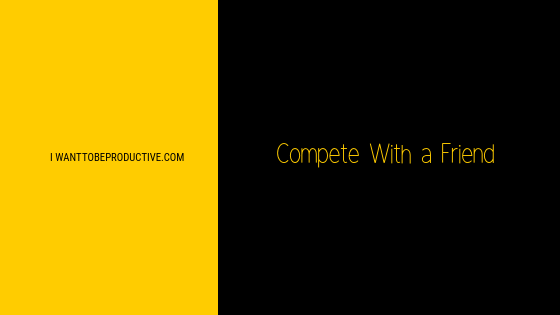
It might seem a bit counter-intuitive, but working alongside other people improves your focus. The phenomenon is called social facilitation and was observed by Norman Triplett in 1898.
During his research, Triplett found that people focus better when working in the same setting as peers performing the same task, even when not working towards the same goal, in the same team, or on the same project.
Moreover, for most people, merely having an audience when performing a certain task increased productivity. This is also called the audience effect and is allegedly based around our social nature – although some would argue it also calls upon our competitive side. Here’s the full resource for those interested, The Dynamogenic Factors in Pacemaking and Competition.
However, the audience effect mostly applies to tasks we’re already accustomed to. When it comes to focusing on new or difficult tasks, audiences usually hinder our focus, productivity, and performance.
This is even more valid for audiences that are closely following the task you’re performing versus the ones that are just minding their own business. Opposite sex audiences also tend to hinder our focus, although I personally believe the sex you’re attracted to matters more – but don’t take my word for granted on this one.
Give Yourself a Menacing Deadline to Stay Super Focused
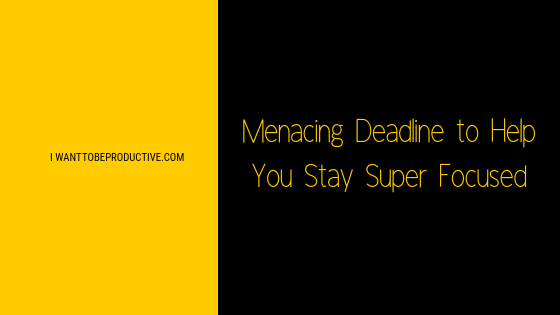
According to a 2012 study on Time Pressure, Performance, and Productivity by Don A. Moore and Elizabeth R. Tenney, time pressure usually impairs decision making, curiosity, and exploration, making us rely more on the skills and cognitive abilities we’ve already developed.
While this sounds bad for creative tasks or decision making, it can be a great help when it comes to brainless, repetitive tasks – especially if you highly dislike doing them.
If you have a whole morning to send a few emails, fill out reports, or go through other tedious tasks that would generally take you 30 minutes to complete, you are much more likely to double or even triple this time.
But if you challenge yourself to get them done in 20, you’re much more likely to dive right in and power through it!
Focus on Yourself: Work on Your Habits!
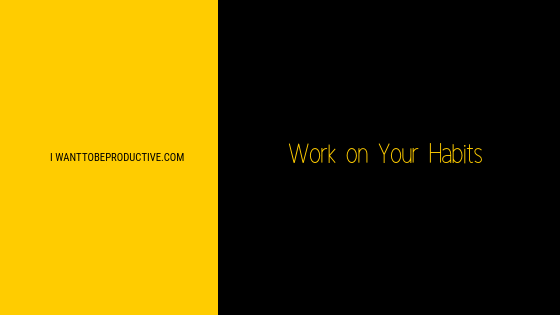
Generally speaking, a habit is formed through a self-reinforcing loop made out of a trigger that leads to a routine that leads to an effect.
- The trigger can be a challenge to identify sometimes – it can be a place, an emotional state, a time of the day, a person, an event, etc.
- The routine is the action you pursue, like snacking on something sweet or getting in a certain mood.
- The effect or reward is what you accomplish through said routine.
If you want to find out more about how to identify every gear in the machine of habits, I recommend checking out our article on how to stop bad habits and replace them with good ones.
Set Clear Goals to Stay Focused
Correctly setting goals provides perspective, takes off pressure, and empowers you in the long run. It helps you see where you are, where you want to be, and what to do about it.
Here are the basics of SMART goals and some questions to help you formulate them as clearly as possible:
Specific
What do you want to achieve?
How do you want to achieve it?
When, where, and with whom?
Why do you want to achieve it?
Measurable
How will you quantify your success?
Attainable
Is it realistic of you to expect this?
Relevant
Is your goal tied to another objective of yours?
Will the goal will help you achieve
Timebound
When/By which date do you want to achieve this goal?
If you want to find out more about SMART goal setting, download a free worksheet, and see some other useful tips, check out our article on How to Set SMART Goals: Worksheet & Step By Step Guide. It’s only a 3-minute read, but it might benefit you for years to come!
Conclusion
This draws our resource on how to stay focused at work and on your career to an end. In the next chapter, we’ll tackle another challenging, but achievable goal: staying focused in school.
Until then, I hope you found these helpful and I’m interested in your results after implementing them – please give us a shout and let us know how it went!

I’m passionate about personal development and growth, personality traits, and all things related. When I’m not working on myself, I enjoy hiking in the great outdoors, reading, watching movies, and taking care of my indoor garden. But my strongest passion will always be self-help.


